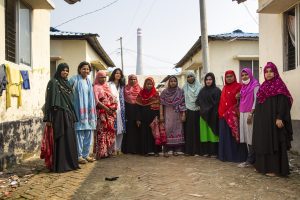In the southeastern coastal area of Matarbari, Bangladesh, a group of women are forging a new life through embroidery and art in the shadow of a massive new coal power plant, which looms over hundreds of families displaced by its construction.
Jannatul Naim Jhuma’s family used to have three houses where the coal power plant now sits. One belonged to her father and two to her brothers. When construction started on the Matarbari 1 coal power plant, they were forced to leave their homes and relocate to small concrete houses beside the polluting power plant, which belched black smoke overhead.
Bangladeshi environment groups and local community members are very concerned about the coal power project, and how Japanese companies worked with authorities to acquire nearly 6 square kilometers of land to build the coal power plant.
The first phase of the project has been jointly developed by the state-owned Coal Power Generation Company Bangladesh Limited along with Japanese companies: Sumitomo Corporation, IHI Corporation and Toshiba. Sumitomo Banking Corporation (SMBC) acted as financial adviser. Japanese companies, including power giant JERA a joint venture of TEPCO and Chubu Electric Power, Mitsubishi Corporation, and megabanks SMBC and MUFG are involved in further expansion of fossil fuels in Matarbari.
Local homes have not been the only casualty of this massive coal power plant. Traditional livelihoods like salt and fish farming have also been lost forever due to the plant’s construction. Many families are in crisis.
But despite the ongoing impacts from the coal power plant, 30 displaced women have come together, striving to rebuild their lives and find ways of securing an income and providing for their families. The women have found a voice and a new way of sharing their story and art with the world through embroidery.










































